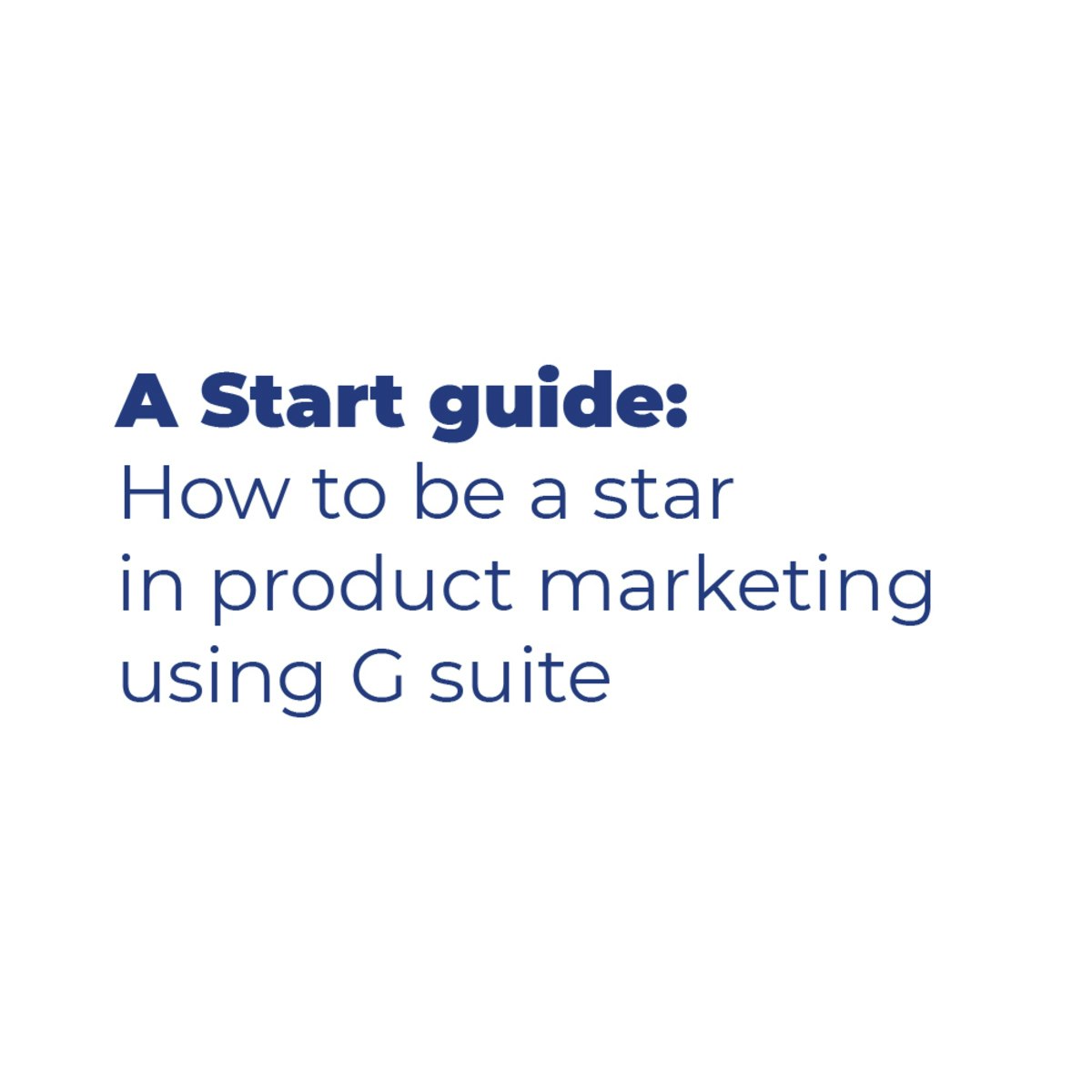Product Marketing Manager
Decoding the Role: A Comprehensive Guide to Becoming a Product Marketing Manager
A Product Marketing Manager (PMM) acts as the crucial link between a company's product development teams and its broader marketing and sales efforts. Their primary mission is to understand the target market deeply, shape the product's messaging and positioning, and drive successful product launches and ongoing market adoption. Think of them as the chief storyteller and strategist for a specific product or product line.
Working as a PMM often involves the excitement of bringing new innovations to life and seeing them succeed in the marketplace. It's a dynamic role requiring a blend of analytical rigor, creative thinking, and strong interpersonal skills to orchestrate efforts across various departments like product management, sales, and marketing communications. If you enjoy understanding customer needs, crafting compelling narratives, and driving business growth, this career path might be highly engaging.
Introduction to Product Marketing Management
What Exactly is a Product Marketing Manager?
At its core, the Product Marketing Manager is responsible for the commercial success of a product. They translate the features and capabilities developed by the product team into clear value propositions that resonate with target customers. This involves defining who the ideal customer is, understanding their pain points, and articulating how the product solves those problems better than alternatives.
This role demands a strategic mindset focused on market dynamics. PMMs conduct research to grasp the competitive landscape, identify market opportunities, and inform product strategy. They are pivotal in ensuring that the product not only meets technical specifications but also addresses a genuine market need and is positioned effectively to capture market share.
Ultimately, a PMM champions the product externally to customers and internally to sales and marketing teams. They ensure everyone understands the product's value and target audience, equipping them with the knowledge and tools needed for effective selling and promotion. Their work directly influences revenue generation and long-term product viability.
How PMMs Differ from Similar Roles
While closely related, the PMM role is distinct from that of a Product Manager (PM) or a Brand Manager. A Product Manager typically focuses inward, defining the product vision, prioritizing features, and guiding the development team to build the product. They own the 'what' and 'why' of the product itself.
In contrast, the PMM focuses outward, defining the product's market strategy, messaging, and launch plan. They own the 'how' of bringing the product to market successfully and ensuring its commercial traction. They are the experts on the customer, the market, and the competitive landscape, translating product features into customer benefits.
A Brand Manager, often found in consumer packaged goods (CPG) companies, focuses on building and maintaining the overall image and reputation of a brand, which might encompass multiple products. While PMMs contribute to brand perception through product positioning, their scope is typically centered on a specific product or product line's market success.
Where Do Product Marketing Managers Work?
Product Marketing Managers are prevalent across various industries, particularly in technology (software, hardware, SaaS), telecommunications, and increasingly in sectors like finance, healthcare, and e-commerce. Any company with distinct products or services that require strategic positioning and market introduction can benefit from a PMM function.
The role exists in companies of all sizes. In large corporations, PMMs often specialize in a specific product or market segment. They work within established marketing departments, collaborating with large sales teams and extensive resources. The structure provides clear paths for advancement but can sometimes involve navigating complex organizational hierarchies.
In startups and smaller companies, a PMM might wear multiple hats, handling broader marketing responsibilities alongside core product marketing duties. This environment offers significant impact and autonomy but often requires more resourcefulness and adaptability. The experience gained in a startup can be invaluable for developing a holistic understanding of business operations.
Key Responsibilities of a Product Marketing Manager
Market Research and Competitive Analysis
A fundamental responsibility of a PMM is conducting thorough market research. This involves identifying target customer segments, understanding their needs, motivations, and buying processes. Methods range from surveys and interviews to analyzing user data and market reports.
Competitive analysis is equally critical. PMMs constantly monitor competitors' products, pricing, messaging, and market activities. This intelligence informs product differentiation strategies, helps anticipate market shifts, and identifies potential threats or opportunities for the PMM's own product.
The insights gathered from market and competitive research directly shape the product's positioning and messaging. PMMs use this data to craft compelling narratives that highlight the product's unique value and differentiate it effectively in a crowded marketplace. This research ensures marketing efforts are targeted and relevant.
Understanding market dynamics and customer behavior is essential for success. These courses provide frameworks and techniques for effective market analysis.
Go-to-Market Strategy and Execution
Developing and executing the Go-to-Market (GTM) strategy is arguably the PMM's most defining responsibility. This comprehensive plan outlines how a product will reach its target customers and achieve competitive advantage. It encompasses target audience definition, positioning, messaging, pricing, sales channels, and promotional activities.
The PMM orchestrates the GTM launch, coordinating across departments like product development, sales, marketing communications, and customer support. They ensure all teams are aligned on the strategy, equipped with the necessary materials (like sales decks and marketing collateral), and ready to execute their respective parts of the plan.
Post-launch, the PMM monitors performance, gathers feedback, and iterates on the GTM strategy as needed. This involves tracking key metrics, analyzing market response, and making adjustments to messaging, pricing, or channel strategies to optimize results and ensure sustained product growth.
These courses cover the critical phases of product launch and Go-to-Market strategy development, essential skills for any PMM.
Sales Enablement and Cross-Functional Collaboration
PMMs play a vital role in enabling the sales team to sell the product effectively. This involves creating compelling sales collateral, such as presentations, datasheets, case studies, and battle cards that clearly articulate the product's value proposition and competitive advantages.
They also deliver sales training, ensuring that salespeople understand the target customer, key messaging points, and how to handle objections. This ongoing communication ensures the sales team is confident and knowledgeable when interacting with prospects.
Effective collaboration across functions is paramount. PMMs work closely with product managers to provide market feedback for future development, with marketing teams to align on campaigns, and with customer success teams to understand user adoption and satisfaction. This requires strong communication and influence skills.
These books offer insights into strategies for gaining market traction and effective communication, often involving sales and cross-functional teams.
Performance Measurement and Optimization
Measuring the success of product marketing initiatives is crucial. PMMs define Key Performance Indicators (KPIs) to track the effectiveness of their strategies. These might include metrics related to product adoption rates, market share, lead generation, conversion rates, campaign ROI, and customer satisfaction.
They regularly analyze performance data to understand what's working and what isn't. This involves using analytics tools to monitor website traffic, campaign results, sales data, and customer feedback. Data-driven insights guide strategic adjustments and resource allocation.
Based on performance analysis, PMMs optimize their marketing programs. This could involve refining messaging, adjusting target audiences, experimenting with different channels, or tweaking pricing strategies. Continuous optimization is key to maximizing impact and achieving business objectives.
These courses focus on leveraging data and analytics to drive marketing decisions and measure campaign performance.
Essential Skills and Qualifications
Technical and Analytical Skills
While not always deeply technical, PMMs benefit from a degree of technical aptitude, especially in tech-focused industries. Understanding the product's core technology helps in translating features into benefits and communicating effectively with product and engineering teams.
Analytical skills are essential for interpreting market research data, tracking performance metrics, and making data-informed decisions. Familiarity with analytics platforms like Google Analytics and data visualization tools such as Tableau is often expected.
Experience with Customer Relationship Management (CRM) systems like Salesforce or HubSpot is also valuable, as these tools are central to managing customer interactions, tracking sales pipelines, and analyzing marketing campaign effectiveness.
These courses provide hands-on experience with HubSpot, a popular CRM and marketing automation platform used by many PMMs.
Soft Skills: Communication and Influence
Exceptional communication skills, both written and verbal, are non-negotiable for PMMs. They must craft clear, compelling messaging for diverse audiences, including customers, sales teams, executives, and technical colleagues. Storytelling ability is key to making product narratives resonate.
Stakeholder management is another critical soft skill. PMMs interact with numerous teams and individuals across the organization, often needing to align priorities and influence decisions without direct authority. Building strong relationships and navigating internal dynamics are crucial for success.
Strategic thinking and problem-solving abilities enable PMMs to analyze complex market situations, identify opportunities, and develop effective strategies. They need to be adaptable and resilient, capable of navigating ambiguity and pivoting when necessary.
Effective communication is a cornerstone of the PMM role. This course provides a capstone experience focusing on writing, design, and presentation skills.
This book delves into the challenges of leadership and navigating difficult decisions, relevant for managing stakeholders and driving strategy.
Education, Certifications, and Experience
A bachelor's degree in marketing, business, communications, or a related field is typically required for entry-level PMM roles. For roles in highly technical industries, a degree in a technical field combined with business acumen can also be advantageous.
While not always mandatory, certifications can enhance credibility and demonstrate specialized knowledge. Organizations like Pragmatic Institute offer well-regarded certifications in product management and marketing. Various PMM-specific online programs and bootcamps are also available, offering focused training.
Experience often weighs heavily. Many PMMs transition from roles in marketing, sales, product management, or market analysis. Entry-level positions might be titled Associate PMM or Product Marketing Specialist. Progressing to senior roles usually requires several years of proven success in launching products and driving market growth.
For those looking to transition or build foundational skills, these courses offer introductions to product management and marketing principles.
Career Progression for Product Marketing Managers
Typical Entry Points and Pathways
Common entry points into product marketing include roles like Marketing Coordinator, Marketing Specialist, Sales Representative, or even technical roles like Sales Engineer or Support Specialist in tech companies. Some individuals enter directly as an Associate Product Marketing Manager after completing relevant internships or graduate programs.
Early-career professionals focus on mastering core PMM tasks like market research, messaging development, collateral creation, and supporting specific aspects of a product launch under the guidance of more senior team members.
Building a portfolio of successful product launches and demonstrating impact on key business metrics are crucial for advancement. Networking within the industry and seeking mentorship can also significantly aid career growth.
Promotion Trajectories and Senior Roles
With experience and proven results, PMMs can advance to Senior Product Marketing Manager roles. These positions typically involve leading strategy for larger or more complex products, managing junior team members, and having greater influence on overall product and marketing direction.
Further progression can lead to titles like Group PMM, Director of Product Marketing, or Vice President of Marketing. At these levels, responsibilities shift towards managing teams, setting departmental strategy, overseeing multiple product lines, and contributing to executive-level decision-making.
Success in senior roles requires not only deep product marketing expertise but also strong leadership, strategic vision, and business acumen. Understanding financial metrics and market trends becomes increasingly important.
These courses provide insights into product leadership and strategy, relevant for those aiming for senior PMM positions.
This book provides frameworks for effective product leadership and team alignment.
Lateral Moves and Industry Impact
The skills developed as a PMM are highly transferable, opening doors to various lateral career moves. A common transition is into Product Management, leveraging market knowledge to influence product development more directly.
Other potential paths include moving into general management, business development, marketing strategy roles, or even founding a startup. The PMM's broad understanding of the product lifecycle, market dynamics, and customer needs provides a strong foundation for diverse leadership positions.
Industry specialization can significantly impact career growth. Developing deep expertise in a specific sector (e.g., fintech, healthcare tech, enterprise SaaS) can make a PMM highly valuable and sought-after within that niche. Specialization often leads to higher earning potential and more focused career opportunities.
Formal Education Pathways
Relevant Undergraduate Degrees
While there isn't one single required degree, majors in Marketing or Business Administration provide a strong foundation. These programs typically cover core concepts like market analysis, consumer behavior, branding, pricing strategies, and marketing communications – all directly relevant to the PMM role.
Degrees in Communications can also be beneficial, emphasizing skills in messaging, public relations, and persuasive writing. For PMM roles in tech, some individuals come from technical backgrounds (like Computer Science or Engineering) and later add business or marketing knowledge through experience or further education.
Regardless of the major, coursework or experiences involving market research, data analysis, project management, and presentation skills are particularly valuable additions to one's academic profile when pursuing a PMM career.
This classic text provides a comprehensive overview of marketing principles often covered in undergraduate and graduate business programs.
The Value of an MBA or Advanced Degrees
An MBA (Master of Business Administration) is not strictly required to become a PMM, but it can be a significant asset, particularly for career advancement into senior leadership roles. MBA programs often deepen understanding of business strategy, finance, operations, and leadership – broadening a PMM's perspective beyond pure marketing.
Many MBA programs offer specializations in marketing or product management, providing focused coursework and networking opportunities relevant to the PMM path. The degree can be particularly helpful for individuals transitioning from non-business backgrounds or seeking to accelerate their move into management.
However, an MBA represents a substantial investment of time and money. The decision to pursue one should weigh the potential benefits against the costs and consider whether practical experience and targeted skill development might offer a more efficient path depending on individual circumstances and career goals.
Key Academic Concepts
University coursework covering pricing strategy is highly relevant, as PMMs often contribute to or own pricing decisions. Understanding different pricing models, value-based pricing, and competitive pricing dynamics is crucial.
Courses in consumer psychology or behavioral economics provide valuable insights into how customers make decisions, perceive value, and respond to marketing messages. This understanding helps PMMs craft more effective positioning and campaigns.
Strong foundations in market analysis, statistics, and strategic management frameworks (like SWOT analysis or Porter's Five Forces) learned in academic settings are directly applicable to the day-to-day analytical and strategic work of a Product Marketing Manager.
This course provides essential grounding in analyzing market context, a core PMM activity often taught academically.
Online and Self-Directed Learning
Leveraging Online Courses for Skill Development
Online courses offer a flexible and accessible way to acquire foundational knowledge and specific skills needed for a PMM career. Platforms like OpenCourser aggregate thousands of options, allowing learners to find courses on market research, GTM strategy, digital marketing, analytics, and more.
Learners can choose between comprehensive programs offering broad overviews or shorter, skill-based courses targeting specific competencies like SEO, content marketing, or using particular analytics tools. This flexibility allows individuals to tailor their learning to their specific needs and career stage.
Online learning is particularly valuable for career pivoters who need to bridge skill gaps without committing to a full-time degree program. It also enables current professionals to stay updated on the latest marketing trends and technologies. Many courses offer certificates upon completion, which can be added to resumes and LinkedIn profiles.
OpenCourser's Learner's Guide provides tips on how to effectively structure self-learning paths and make the most of online educational resources.
These courses offer foundational knowledge in product management and marketing strategy, ideal starting points for self-directed learning.
Building a Portfolio Through Projects
Theoretical knowledge is important, but practical application is what truly demonstrates capability to potential employers. Many online courses incorporate hands-on projects, allowing learners to practice skills in a simulated environment.
Aspiring PMMs can proactively build a portfolio by undertaking personal projects. This could involve creating a mock GTM strategy for a fictional product, conducting market analysis for an existing product category, or developing sample messaging and positioning documents.
Contributing to open-source projects or volunteering marketing expertise for non-profits can also provide real-world experience and tangible results to showcase. Documenting these projects clearly, outlining the process, analysis, and outcomes, creates compelling evidence of PMM skills.
These project-based courses allow learners to apply PMM concepts and build tangible portfolio pieces.
Combining Free and Structured Resources
A wealth of free resources exists online, including blogs, podcasts, webinars, and articles from industry experts and publications. These are excellent for staying current on trends, learning specific tactics, and gaining different perspectives on product marketing challenges.
While free resources are valuable, structured online courses or programs provide a more organized learning path, ensuring comprehensive coverage of fundamental concepts. They often include curated content, guided exercises, and assessments to reinforce learning.
A balanced approach often works best: using structured courses to build a solid foundation and supplementing this with free resources for ongoing learning, deep dives into specific topics, and staying abreast of industry news. Budget-conscious learners can check for discounts on OpenCourser Deals.
These books are considered foundational reads in product development and marketing strategy, complementing online learning.
Industry Trends Shaping PMM Roles
The Impact of Artificial Intelligence (AI)
Artificial Intelligence is significantly reshaping product marketing. AI tools can automate market research, analyze vast datasets to identify nuanced customer segments, and personalize marketing messages at scale. PMMs need to understand how to leverage these tools effectively.
AI assists in optimizing campaign performance by predicting which messages or channels are most likely to resonate with specific customer profiles. It can also power chatbots for customer interaction and automate the creation of initial content drafts, freeing up PMMs for more strategic tasks. As noted in reports from firms like McKinsey, generative AI is rapidly impacting marketing functions.
However, reliance on AI also requires PMMs to develop new skills in data interpretation, prompt engineering for generative AI tools, and ensuring ethical use of customer data and AI-driven personalization. The human element of understanding customer emotion and crafting truly resonant stories remains crucial.
These courses explore the application of AI in marketing and business contexts.
Globalization and Market Complexity
As companies increasingly operate on a global scale, PMMs face the challenge of adapting product positioning and messaging for diverse international markets. This requires understanding cultural nuances, local regulations, and varying competitive landscapes.
Tailoring GTM strategies for different regions often involves more than just translation; it may require adjustments to product features, pricing models, and channel strategies to suit local preferences and market conditions. PMMs need strong cross-cultural communication skills and may collaborate with regional marketing teams.
Managing global product launches demands careful coordination and planning to ensure consistency in brand messaging while allowing for necessary localization. Understanding international market entry strategies and navigating the complexities of global distribution are becoming increasingly important skills.
Shift Toward Product-Led Growth (PLG)
Product-Led Growth (PLG) is a GTM strategy where the product itself is the primary driver of customer acquisition, conversion, and expansion. Companies employing PLG often rely on free trials, freemium models, and in-product experiences to attract and retain users.
In a PLG model, the PMM's role evolves. There's a greater emphasis on understanding user behavior within the product, optimizing the user onboarding experience, and crafting in-product messaging that encourages upgrades or adoption of new features. Collaboration with product and growth teams becomes even tighter.
PMMs in PLG environments focus heavily on communicating value through the product experience itself, rather than relying solely on traditional sales and marketing channels. Measuring success often involves tracking product usage metrics, conversion rates from free to paid tiers, and user engagement levels.
This course specifically addresses product-led strategies, a growing trend impacting PMM roles.
This book offers practical advice on designing products and value propositions that drive customer adoption, relevant to PLG.
Ethical Considerations in Product Marketing
Balancing Growth Targets with Consumer Privacy
Product marketing often involves collecting and utilizing customer data to personalize experiences and target campaigns. PMMs face the ethical challenge of balancing aggressive growth targets with respecting consumer privacy rights.
Regulations like the GDPR in Europe and CCPA in California impose strict rules on data collection, consent, and usage. PMMs must ensure their strategies and tactics comply with these regulations, prioritizing transparency and user control over data. Ethical data handling builds trust and long-term customer loyalty.
This involves careful consideration of data minimization (collecting only necessary data), providing clear opt-out mechanisms, and being transparent about how data is used. The pursuit of growth should not come at the expense of ethical data practices.
Understanding responsible AI development includes aspects of data privacy and transparency, crucial in modern marketing.
Regulatory Compliance in Marketing
Beyond privacy, PMMs must adhere to various regulations governing advertising and marketing practices. Guidelines from bodies like the Federal Trade Commission (FTC) in the US dictate requirements for truthfulness in advertising, disclosure of endorsements, and avoidance of deceptive practices.
Ensuring marketing claims are substantiated, avoiding misleading comparisons with competitors, and being clear about pricing and terms are essential compliance areas. PMMs often work with legal teams to review marketing materials and ensure they meet regulatory standards.
Non-compliance can result in hefty fines, legal action, and significant damage to brand reputation. Staying informed about relevant regulations in all operating markets is a critical responsibility for PMMs and their teams.
Ethical Storytelling and Competitive Practices
Crafting compelling product narratives is key to product marketing, but this must be done ethically. Storytelling should be authentic and truthful, avoiding exaggeration or manipulation. It should focus on genuinely communicating the product's value and how it helps customers.
In competitive positioning, PMMs must maintain ethical standards. While highlighting differentiators is necessary, this should not involve spreading misinformation about competitors or engaging in unfair disparagement. Focus should remain on the positive attributes and benefits of one's own product.
Ethical considerations extend to ensuring marketing materials are inclusive and avoid perpetuating harmful stereotypes. PMMs have a responsibility to contribute to marketing practices that are respectful, fair, and socially responsible.
This course offers a critical perspective on marketing practices, touching upon ethical dimensions.
Frequently Asked Questions (Career Focus)
What is the typical salary range for a Product Marketing Manager?
Salary ranges for Product Marketing Managers vary significantly based on factors like years of experience, industry, company size, and geographic location. Entry-level roles (Associate PMM, PMM I) might start in the range of $70,000 to $100,000 USD in major US metropolitan areas.
Mid-level PMMs with several years of experience can expect salaries typically ranging from $100,000 to $150,000+, often supplemented by bonuses or stock options, especially in the tech industry. Senior PMMs, Directors, and VPs can command salaries well exceeding $150,000, sometimes surpassing $200,000 or more with significant leadership responsibilities.
Salary benchmarks can be found through resources like the U.S. Bureau of Labor Statistics (which aggregates data for broader Marketing Manager roles) or industry-specific salary surveys from firms like Robert Half. Remember that these are general guides, and actual compensation depends heavily on the specific role and company.
How can someone transition from a technical role (like engineering) to PMM?
Transitioning from a technical role (e.g., Software Engineer, Data Scientist) to PMM is a common path, particularly in tech companies. Technical professionals already possess deep product knowledge, which is a significant advantage.
Key steps involve actively developing marketing acumen and demonstrating business understanding. This can be achieved through online courses focused on marketing fundamentals, strategy, and communication. Seeking out cross-functional projects that involve working with marketing or sales teams within the current company can provide valuable experience.
Highlighting transferable skills is crucial. Emphasize analytical abilities, problem-solving skills, project management experience, and any instances where technical knowledge was used to communicate value or influence decisions. Networking with PMMs and seeking internal transfer opportunities can also facilitate the transition.
This course focuses on acquiring the skills needed for product management roles, which share overlap with PMM and often attract technical transitioners.
Are there freelance or contract opportunities for PMMs?
Yes, freelance and contract opportunities exist for experienced Product Marketing Managers. Companies, particularly startups or those launching specific projects, may hire PMMs on a contract basis for tasks like developing GTM strategies, executing product launches, creating specific marketing collateral, or conducting market research.
Freelancing offers flexibility but requires strong self-discipline, networking skills to find clients, and the ability to quickly understand different businesses and products. Rates vary widely based on experience, project scope, and industry, but experienced freelance PMMs can often command high hourly or project-based fees.
Building a strong personal brand, showcasing a portfolio of successful projects, and leveraging professional networks are key to succeeding as a freelance PMM. Platforms specializing in freelance tech or marketing roles can also be sources of opportunities.
How has remote work impacted PMM career opportunities?
The rise of remote work has significantly broadened opportunities for Product Marketing Managers. Many companies, especially in the tech sector, now offer fully remote or hybrid PMM positions, allowing candidates to apply for roles regardless of their geographic location.
This increases the talent pool for companies and offers more flexibility for PMMs. However, remote work also necessitates strong virtual communication and collaboration skills. PMMs need to be adept at building relationships and driving alignment across distributed teams using digital tools.
While remote work expands options, competition can also increase as geographical barriers diminish. Candidates need to effectively demonstrate their ability to work autonomously and deliver results in a remote setting.
How important are industry certifications compared to experience?
While certifications (like those from Pragmatic Institute or specialized PMM programs) can demonstrate foundational knowledge and commitment to the field, most employers weigh practical experience more heavily. Proven success in launching products, driving adoption, and achieving measurable results is typically the most valued qualification.
Certifications can be particularly beneficial for individuals transitioning into PMM roles or those early in their careers, serving as a signal of competence and dedication. They can also help in learning structured frameworks and industry best practices.
Ultimately, a combination is often ideal. Experience provides the real-world application and context, while certifications can supplement knowledge and potentially provide an edge in a competitive job market. Neither replaces the need for strong core skills and a track record of impact.
What is the career longevity for PMMs in rapidly changing markets?
The PMM role is dynamic and constantly evolving, especially in fast-paced industries like technology. Longevity in this career often depends on adaptability and a commitment to continuous learning. PMMs must stay current with market trends, emerging technologies (like AI), and evolving customer behaviors.
The core skills of understanding customers, crafting value propositions, and developing market strategies remain fundamental and in demand. PMMs who continuously refine these skills and adapt them to new contexts are well-positioned for long-term success.
The ability to embrace change, learn new tools and methodologies (like PLG), and demonstrate strategic thinking will be key to thriving as markets shift. The versatility of the PMM skillset also provides numerous pathways for career growth, both within and beyond product marketing.
The role of a Product Marketing Manager is challenging, strategic, and deeply rewarding for those passionate about connecting products with markets. It requires a unique blend of analytical and creative skills, along with strong collaboration abilities. Whether you are exploring careers, considering a pivot, or looking to advance, understanding the nuances of this role is the first step. We encourage you to explore the resources on OpenCourser to find courses and books that can help you build the necessary skills and knowledge for this exciting field.

































